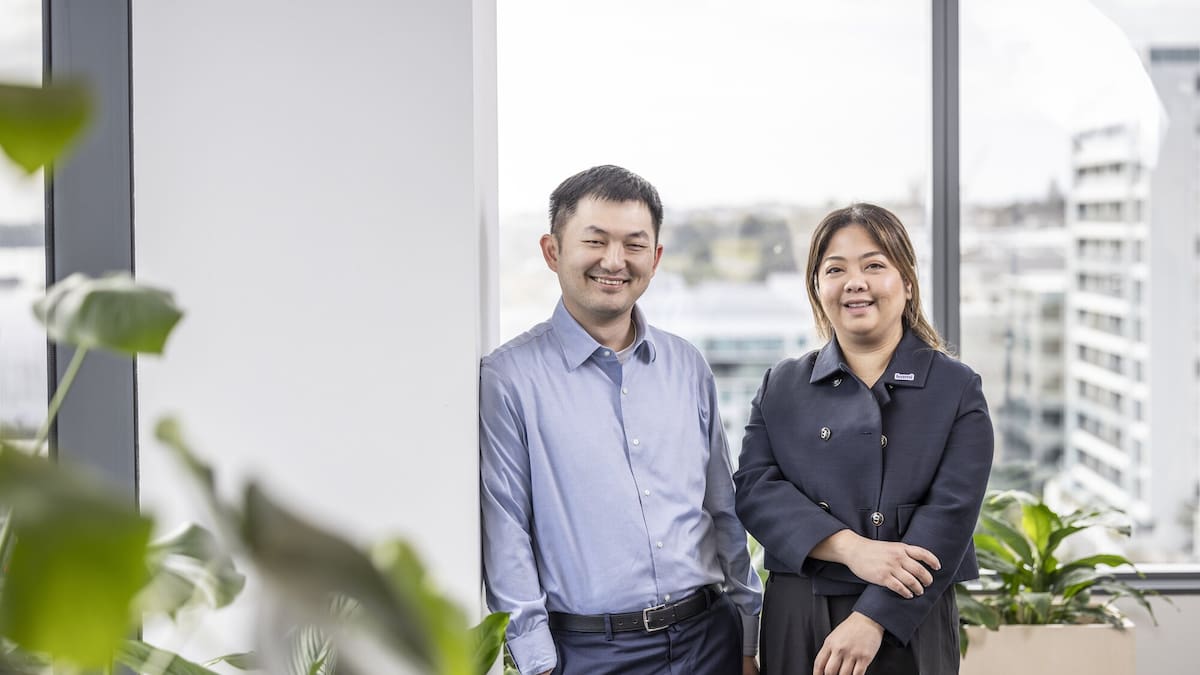The pair led a $1.2m pre-Series A round for the start-up, which was also supported by the Crown-owned New Zealand Growth Capital Partners and ex-Reddit CEO Ellen Pao.
Wang becomes a Komodo director as part of the deal.
Komodo founders Jack Wood (left) and Chris Bacon.
Wang and Samson are now scouting for their next investments.
The pair say they are looking for New Zealand-founded companies in a range of sectors, including technology, software, fashion and film. Key evaluation criteria include demonstration of international sales activity and global market testing, they say.
Investments will range from $300,000 to $1m.
Outside of their new fund, Samson and Wang have earlier investments in Ice House Ventures, Tracksuit, Halter and Yu Mei.
Bacon scores the lettuce
Christchurch-based Komodo, founded in 2017 by Chris Bacon and Jack Wood, has 20 staff and sells its online wellness platform to schools across the world.
Bacon – a Brit who formerly worked for Norwich City FC’s youth academy as he completed a sport science MSc – told the Herald he came to New Zealand when the opportunity arose to study toward a PhD at Christchurch University.
After graduating, he took sports science and sports medicine roles with Christchurch United and the Mainland Football Federation while working on Komodo on the side.
Jack Wood, a fellow Canterbury grad (with a BCom) joined him to take care of things on the business side.
“Initially, Komodo was oriented on the field of sports science, collecting data to predict and prevent injuries,” Bacon said.
But in 2020 – the pandemic year of empty sports fields – Komodo took what Bacon says was a “major pivot” as it refocused on student mental health and wellbeing.
Samson and Wang co-founded Kami with Bob Drummond (left) and Jordan Thoms. Photo / Supplied
Bacon said it was a new audience, but the same principles: “An evidence-based approach, collecting data from multiple sources.”
He and Wood collaborated with psychologists to create surveys and “check-ins” designed both to flag potential issues with individual students and identify any concerning “macro trends” affecting a particular niche or demographic of students.
Komodo’s first customer was one of New Zealand’s poshest schools, King’s College.
Today, Bacon says its software is used by schools of all varieties in “34 or 35 countries”.
“I don’t know the exact amount of students we cover, but it’s in the hundreds of thousands,” he said.
“Annual subscriptions are based on the size and type of school. We just work with the schools on what’s appropriate.”
“Hundreds of schools are paying for their product,” Wang said.
“It was immediately obvious that Chris and Jack are exceptional founders. Within the first 20 minutes, I actually asked them, ‘Are you open for investment? I wanted to invest not just our money, but also my time and energy. This is why I’m taking a board seat.”
Bacon wants that fire
Kami, which makes tools for annotating notes and managing classrooms, was sold to a US private equity firm in a $289m deal last year, but with its founders retaining a 29% stake and Wang remaining chief executive.
It’s just expanded its user base from 50 million to 70 million by snapping up the UK-based Book Creator.
Kami’s wildfire growth was fuelled by its success in North America, which is something Bacon wants to emulate with Komodo.
He said it was a large part of the reason he and Wood went with Hiraya.
“We have major global ambitions, with no signs of slowing down, [we are] currently operating in hundreds of schools across more than 30 countries.
“Learning from Hengjie and Alliv, who successfully scaled Kami into the US, UK and many other markets, will help us accelerate Komodo’s momentum overseas,” Bacon said.
Chris Keall is an Auckland-based member of the Herald’s business team. He joined the Herald in 2018 and is the technology editor and a senior business writer.

